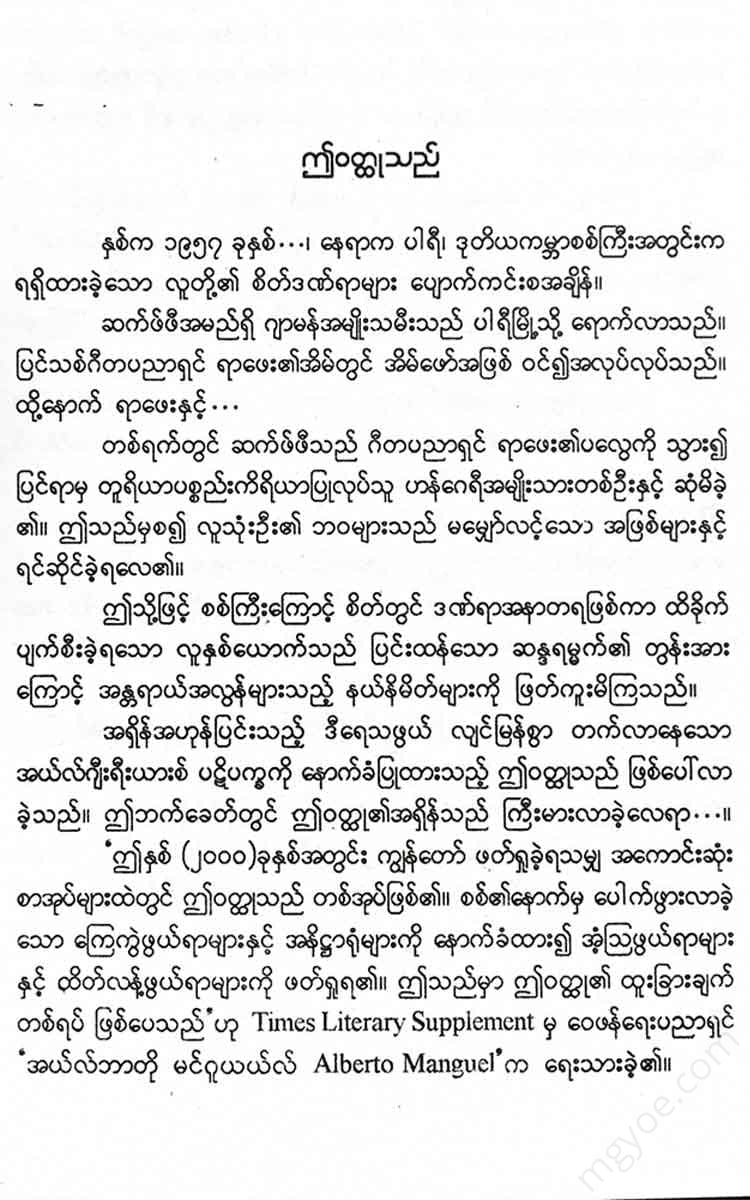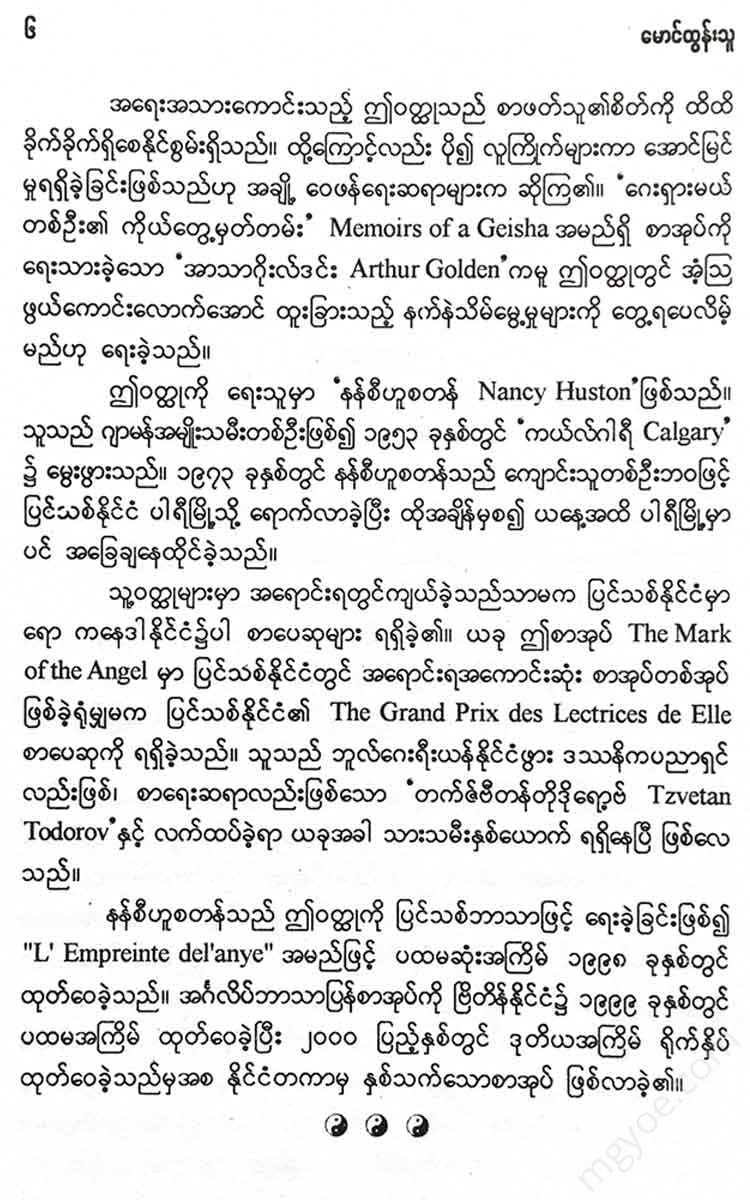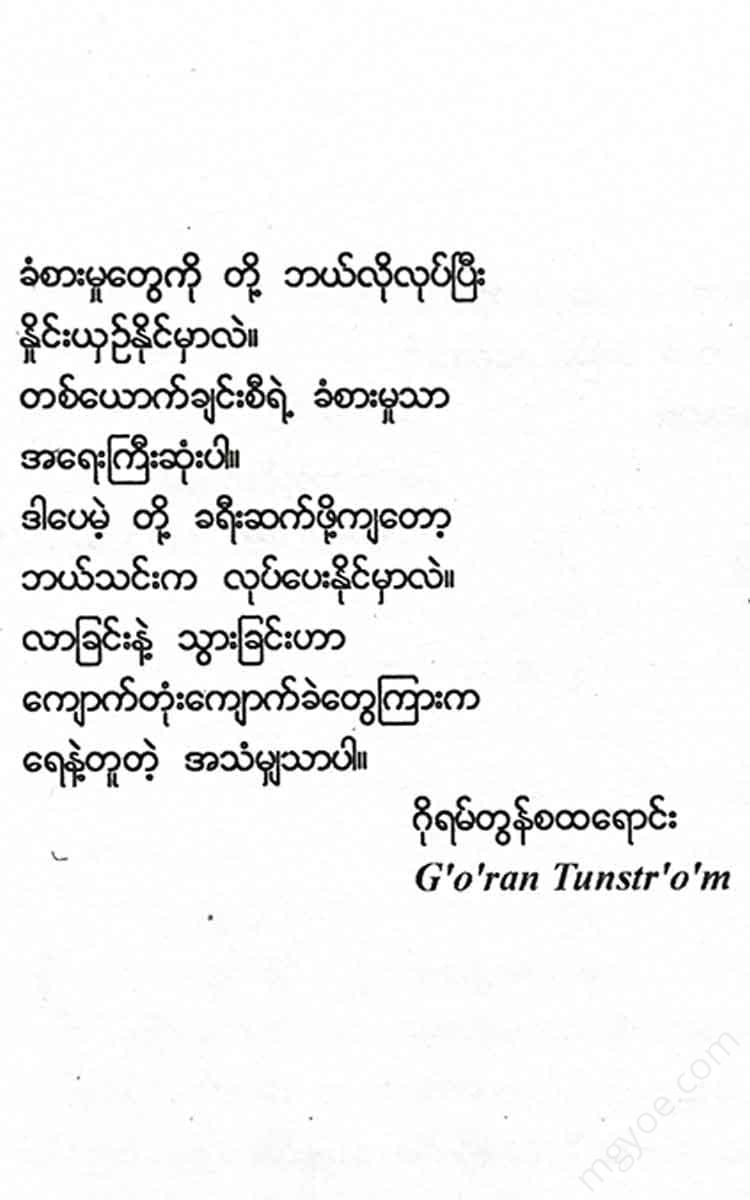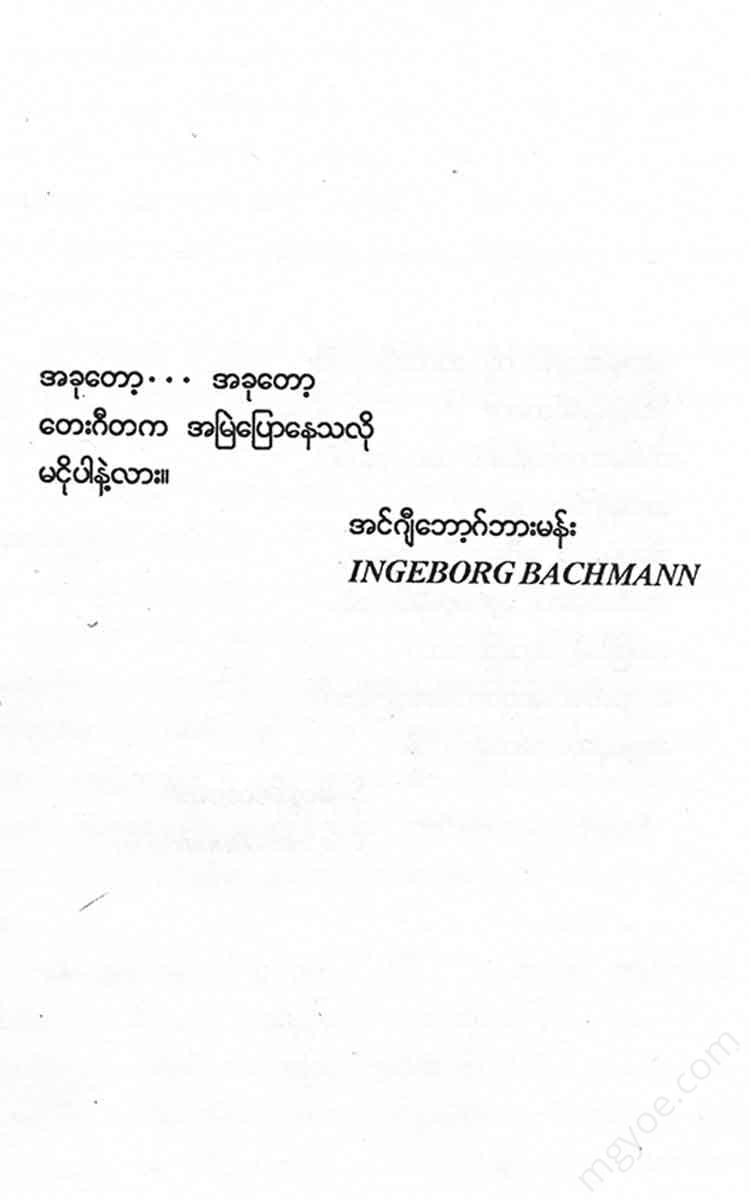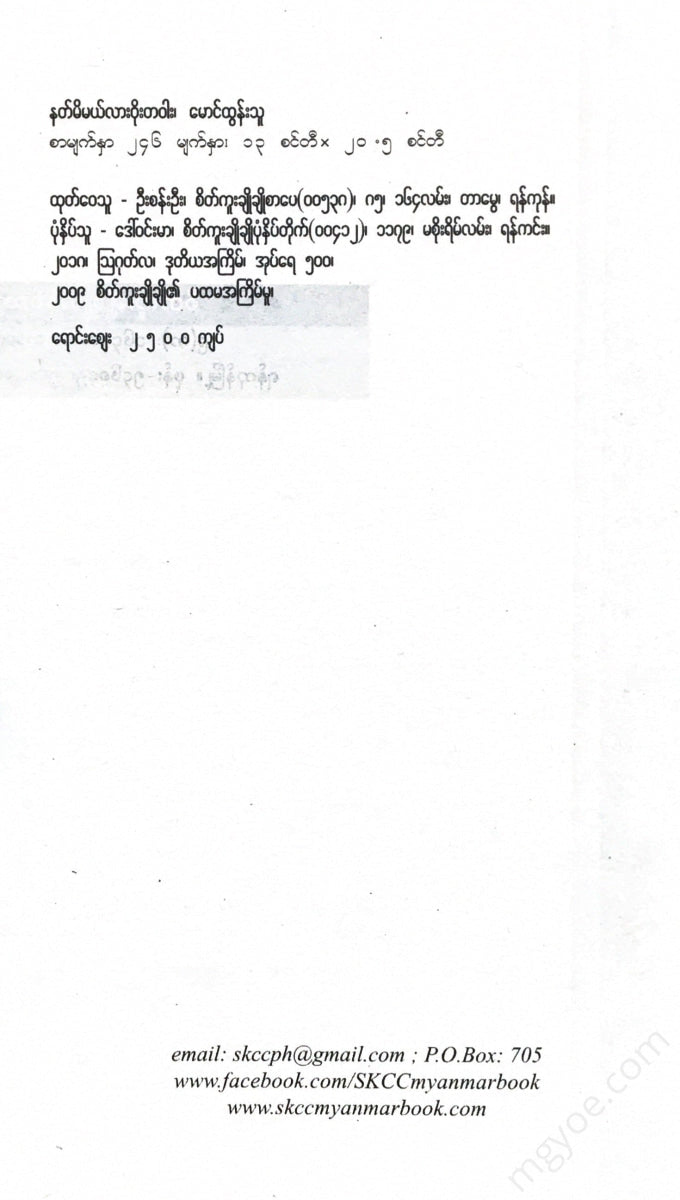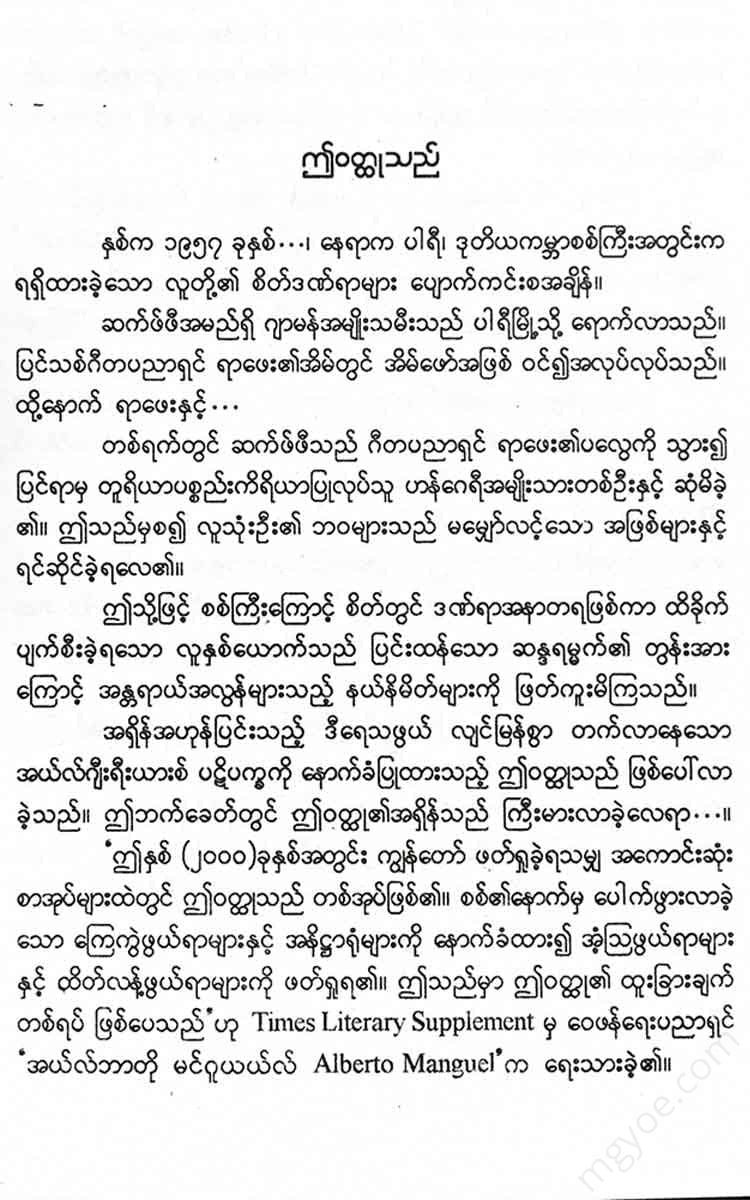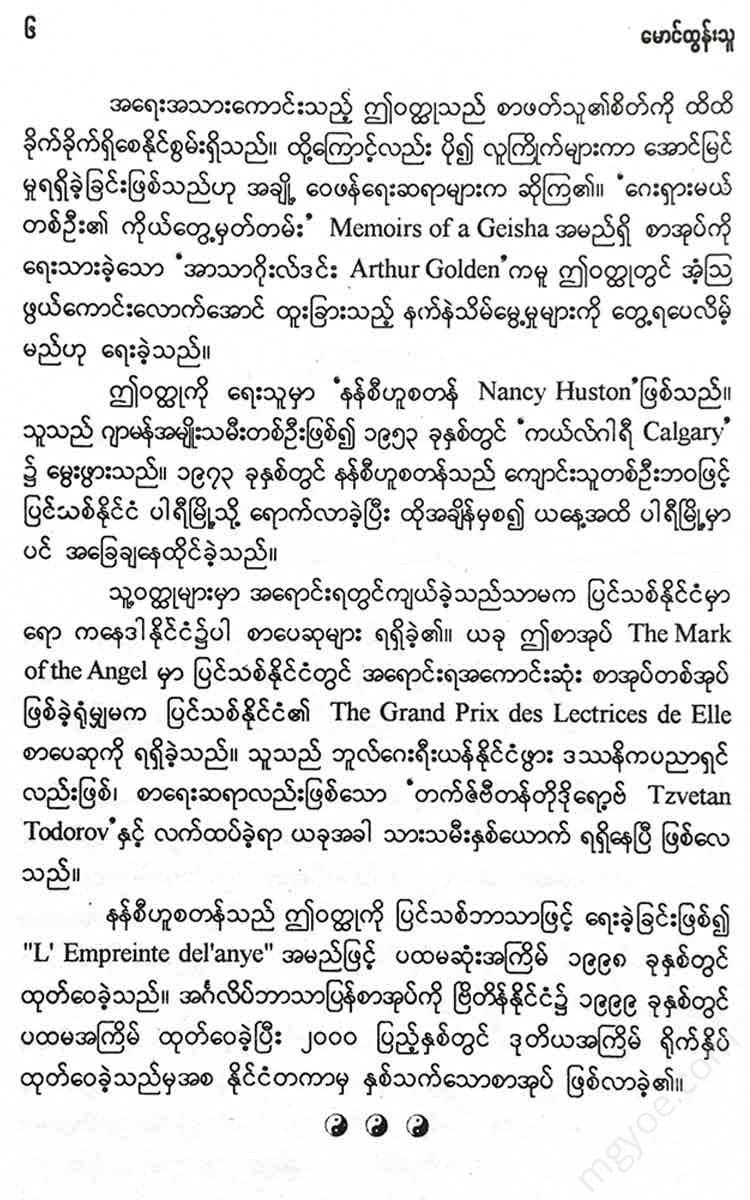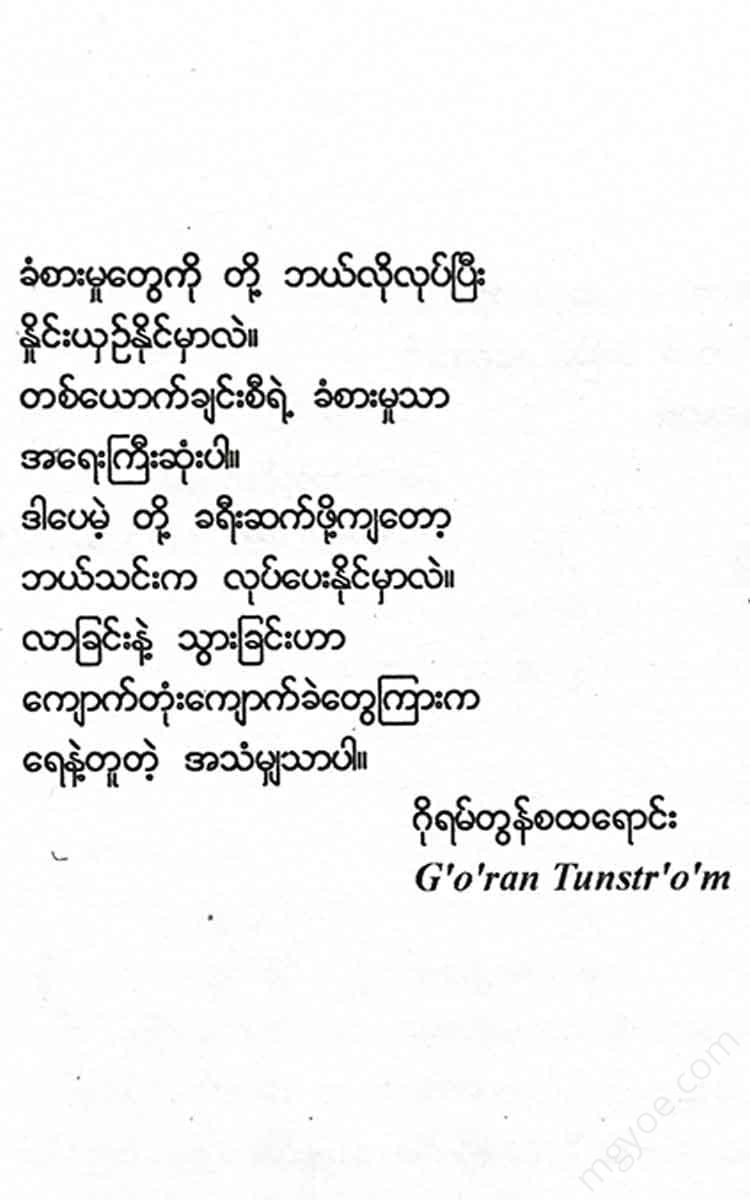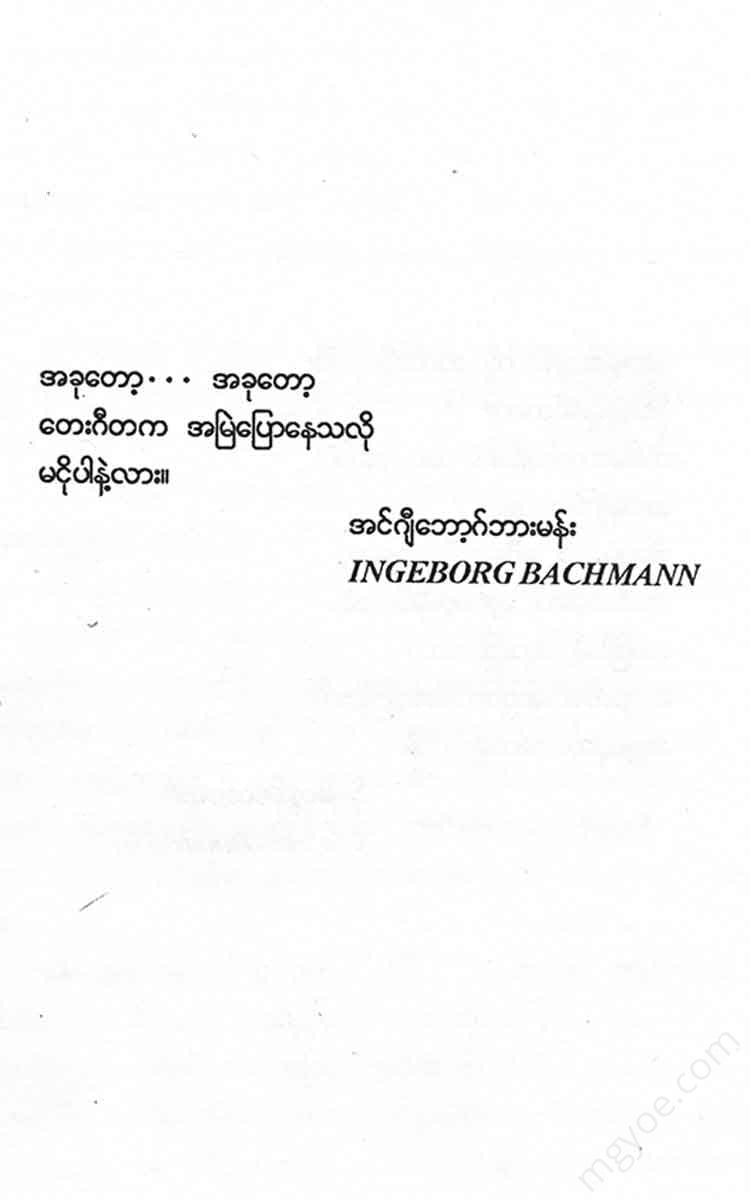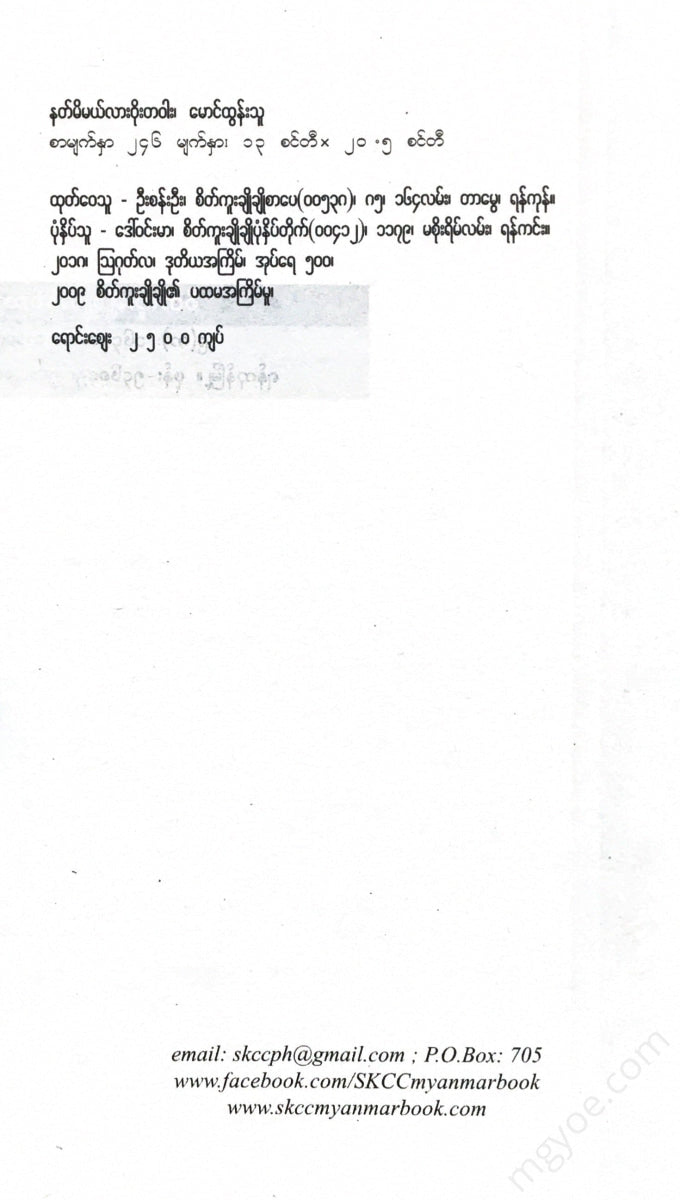စိတ်ကူးချိုချိုစာပေ
Maung Tun Thu - I'm a ghost
Maung Tun Thu - I'm a ghost
Couldn't load pickup availability
Step down
The story begins in May 1957. The setting is Paris.
At that time, France was in the throes of a very turbulent and turbulent period. In the twelve years following the end of World War II, the country had twenty-four governments. Eighty-nine proposals for constitutional amendments were submitted.
But people don't seem to be very interested. According to a recent survey, only 41 percent of French people are interested in politics. The number one person who is most interested is actress Brigitte Bardot. The survey found that 47 percent of people are interested in her and her work.
Anyway, all in all, life is great. It's a modern country. There's no unemployment. Cars come in all shapes and sizes, and TVs in living rooms are bright and colorful. Film directors are making new movies all the time. The number of babies being born is increasing, so much so that it's almost like a boom.
Picasso is also painting a giant mural called “The Fall of Icarus” for the United Nations Educational, Scientific and Cultural Organization (UNESCO). According to him, his painting conveys a profound message. It depicts a peaceful world looking forward to a happy future.
In nature, everything is not perfect, without any flaws. This is the case here and there. Even in France, it is the same. Humanity has so far shown signs of making only a small amount of progress.
For example, let's say that there are 400,000 young Frenchmen who were trained in basic military skills in Germany. They are now in Algeria. What is the purpose? Oh... not to fight a war. Well... I don't think there is any intention to do anything like that. So what is the purpose...? Maybe to make a peace process that will be a little more difficult.
Or... for example...
Oh... my... will you be my Dante? Then I will be your Virgil. Reach out your hand to me. Don't be afraid. I will not abandon you. I will always be by your side as you two slowly descend the stairs.
* * *
(1)
That's him. Selfie... uh... standing there.
His face was extremely pale. To be more precise, it looked as if there was no blood.
He was on the second floor of a grand old house on Rue de Rudi. He was standing at the door of a room in a dark corridor. He was making a move with one hand to knock on the door. And he knocked, his expression as if he were anxious about something. In a vague, indistinct way... He had not been to Paris for a long time. He had only arrived a few days ago. He could see the raindrops beating down on the dirty windows. The surroundings were dull and blue, and the raindrops were dripping... and Paris was very strange to him. Anyway, he had boarded the train in Düsseldorf.
He is already twenty years old.
She was dressed in a modest way. A pleated skirt, a white blouse, and white socks. Her clothes were simple. Nothing special. But she looked strange. She had a black leather handbag. And the shoes she was wearing.
Anyway, the clothes are ordinary. When you look at him closely, Safie looks strange, but the way he dresses and sits is ordinary. Anyway, he is strange. It is not easy to see what is strange about him at first glance. . In the apartment on the other side of the door he is knocking on, a man is playing the flute to Marine Marais's Folies d'Espagne. The flute player plays the same verse six or seven times. He plays it until the rhythm is perfect. He practices it over and over again until he can't make a mistake. Finally, he gets to the point where he can play it without making a mistake.
But Saffi didn't listen to the flute at all. He didn't do anything except stand at the door. He had been knocking on the door for five minutes. No one came to open the door. He didn't knock a second time. He didn't leave the door either.
The guard who had seen Saffi enter the building earlier went up to the second floor to deliver the letter. (Actually, Saffi had taken the elevator to the top floor and then came back down to the second floor.) The guard was quite surprised to see the pale-faced woman standing at the door of Monsialipeich's room.
"What are you doing?" he muttered.
The guard was quite fat. She was ugly. Her face was full of moles. But her eyes showed a kind and compassionate nature. And she was also intelligent.
"That's it... he's in the room, Monsieur Lepage, aren't you ringing the bell?"
Saffi understood the French spoken by the other party. He replied in French, but not fluently.
"I don't ring the bell."
Saffi said.
"I just knocked on the door."
His voice was calm. His French accent was not very clear, so it was a bit strange to listen to.
"How will he hear you knocking?" said Madame Blanche. "You must ring the bell."
As she spoke, Madame Blanche rang the bell. The flute stopped playing immediately. A triumphant smile appeared on Madame Blanche's face.
"Now.. you see it, right?"
Madame Blanche bent forward with difficulty, slipped Monsieur Lefebvre's letter under the door, and then went back down the stairs.
Saffi stood there motionless. It was as if he was surprised that she hadn't moved. Suddenly the door to the room opened. The light from the room spilled out onto the dim hallway.
"What's the fuss about..."
Rafael Lipa wasn't really angry. He was pretending to be. He didn't think it was appropriate for someone looking for a job to press Bell so hard, did he? In any case, Saffi's silence was like a punch in the face. His mind immediately calmed down. His mouth fell shut.
Now, this man and this woman, who had never met before, stood facing each other on either side of the threshold, staring at each other. Or maybe he was staring at the woman in surprise, but the other man... stood motionless where he was.
Rafael Peche was a little confused. He didn't know what to do or what to hold. He had never seen a woman standing right in front of him in his life, looking at him like this before, so it was surprising. He had been playing his flute when the loud, piercing bell had sounded earlier. It was almost as if the sound had suddenly interrupted the peacefulness of his flute.
His attention immediately wandered elsewhere. His mind was no longer on the flute he was playing. He had to pause for a moment between two different worlds. In fact, young women were coming to him because of the advertisement in the “Figaro” newspaper he had placed. And when they did, they were always disturbed.
"Out of the way"
Rafael Peche muttered, distracted. He put his blown Louis Vuitton flute into a blue velvet case and stood up. Then he walked across the living room carpets and out into the hallway.
Everything around him was pure. It was full of color. The walls were covered with colorful and intricate paintings. The oak furniture in the living room was rich and luxurious. Everything about it spoke of wealth and luxury. The fabrics used in the room were not only very soft and delicate, but also red, brown, and gold. But millions of tiny specks of dust were floating in the sunlight.
His mother had told him to take care of the apartment before she left last week. His mother had handed the apartment over to him in Paris before she returned to their home in Burgundy, hadn't she?
The first thing his mother told him was to write an advertisement and place it in the Figaro newspaper. The second thing she told him was to choose the most suitable and promising candidate from among the applicants and hire him. “Be careful not to choose girls with pretty fingers,” his mother warned him. “They are very easy to choose. Their eyes are restless. They are always playing.”
“Want a female housemaid for light housework. Will be responsible for the bedroom and meals. Must have cooking skills.”
The ad was written by Rafael Lepage. He didn't add anything extra except the essentials. He hated the habits and attitudes that the middle class tends to have. The ad didn't say "References required" or "Good character required." -
Saffi had called an hour ago. At that moment, Rafa noticed the tone of the other person's voice. He couldn't tell what country he was from, but the French accent he was speaking in made it clear that he wasn't "French."
In his opinion, that was a valuable skill. What he wanted was a maid like “Maria Felice.” Maria Felice was a Portuguese woman who, as far as he could remember, had been his mother’s trusted maid for many years.
He planned to explain to his new maid what he wanted. He planned to tell her in advance that he was intolerant of noise, that he would never use a vacuum cleaner while he was home, and that she would never dream of singing while dusting the furniture. He also planned to tell her that he would lose his job if he dropped pots and pans while working in the kitchen while he was practicing his flute.
Now he pushed the door open, pretending to control his anger.
"What's the fuss about...?"
He blinked his eyes, until he was used to the darkness in the hallway, and then he studied the face of the woman standing across from him.
Why?
The smile on her face. Her arms were folded at her sides. Her slender body, all of it, he noticed. Then he fell into the woman's eyes. Her eyes were green. As if they held secrets that were difficult to understand. They were like little seeds sprouting from a piece of jade. They expressed calmness.
That's right. From the beginning. Saffi's indifferent behavior had attracted Rafaeli Peche a lot. It had captivated his mind. It had captivated his attention. It had happened since he had first met her. It had happened before he knew her name. He knew that this young woman would not give him any trouble, whether she got the job or not.
As a woman, it seems that it doesn't matter whether she lives or dies. Her integrity and fearlessness are evident. It also clearly shows that she is not a good person.
“Please come in.”
He said in a polite and respectful tone.
Saffi entered the house through the doorway. Her movements were like her eyes. Nothing seemed to matter. Rafael Peche, who was closing the door behind her, was beating his heart. He was holding his breath and keeping his composure.
Then he led Seffy in front of him. Deep down, he knew Seffy's green eyes were staring intently at the back of his head.
When he arrived in the living room, he first sat down on the sofa and gestured for the woman to sit in the chair directly in front of him. The woman sat down in the chair he pointed to without saying a word. The woman's eyes were fixed on the carpet. At the same time, he studied the woman's figure and appearance with interest. .
Her long, beautiful hair was tied up in a rubber band and hung down her back. Her forehead was high, her cheekbones were high, and her lips were beautifully painted. She wore small pearl earrings on each ear. Her nose was pointed. Her eyebrows were beautifully arched. She had a very beautiful, smooth, and graceful face. But she was also very secretive. You couldn't read her mind just by looking at her face.
There was no sign of shame, disgust, or fear on her face. Not even a fake smile. Her makeup and jewelry seemed out of place and out of place. Rafaeli Peche just stared at her.
Not for nothing. With a tingle, he reached for the brass bell. In fact, he had called the maid to make coffee for the guest. With that thought in mind, he rang the brass bell.
Then I came to my senses and shook my head. I laughed inwardly. He didn't have a maid. The maid just arrived. Oh... okay. Where are we? Now... Now... Who are you? .
"You are madam...,
“My name is Saffi,” she said. He asked her to say it again, so she did. Then she showed me how to spell it. Her name starts with an S. If you pronounce it, it should be Saffi. But she just says “Saffi.” Do you know why? She’s a German woman.
* * *
Germans... that word was forbidden in this apartment on Rue de Rudi. His mother didn't call them Krops. She didn't call them Boches. She didn't call them Charisses. She didn't even call them Germans. Her mother always said "they."
Usually, when his mother talked about the Germans, she would press her lips together and not say a word. But one thing was strange: her face was always red. In fact, his mother was Madame Tralle... Liebech's husband did not die fighting the Germans. But it was possible to say that he died at the hands of the Germans.
Madame Tralle Lepage was a widow at the age of forty. Many years passed since then, and no man appeared to love her. No one appeared to be by her side, to nurture her, to care for her, to care for her.
Rafael's father was a history professor at the Sorbonne. He


